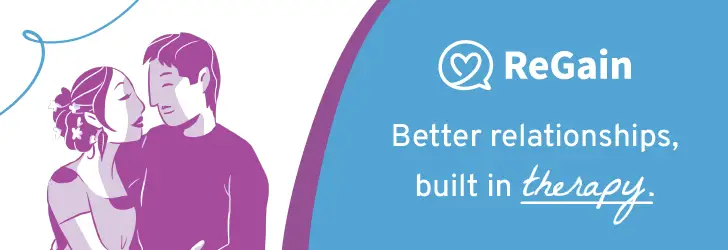As a BetterHelp affiliate, we receive compensation from BetterHelp if you purchase products or services through the links provided
Couples therapy is a powerful tool to enhance relationships and resolve conflicts in a healthy, communicative manner. It can transform the way you and your partner communicate, leading to deeper understanding and emotional connection. This article will explore the goals and methods typically involved in couples therapy.
One of the main goals in couples therapy is identifying the core issues causing conflicts and struggles in your relationship. By working with a therapist, you and your partner can uncover patterns and understand the underlying reasons for your challenges. This understanding can lead to effective strategies to build a stronger and more harmonious partnership.
Another crucial aspect of couples therapy is enhancing communication between partners. Therapists provide a safe space where both partners can express their feelings, needs, and perspectives openly and honestly. This collaborative environment encourages mutual understanding, builds trust, and helps couples find solutions for both parties.
Key Takeaways
- Couples therapy focuses on identifying and resolving core relationship issues
- Enhanced communication is a primary goal in therapy sessions
- Better understanding and trust are built through collaborative work with a therapist

Understanding Couples Therapy
The Role of a Couples Therapist
A couples therapist plays an essential role in helping you and your partner navigate relationship challenges. They guide by listening to both partners, identifying underlying issues, and working with you to develop specific goals and strategies for improvement. Couples therapists can teach communication skills, help you resolve conflicts, and address emotional issues affecting your relationship.
Couples Therapy vs. Couples Counseling
While the terms couples therapy and couples counseling are often used interchangeably, they differ. Couples therapy usually focuses on deep-rooted issues and patterns in your relationship, helping you understand and change these patterns to foster healthier, long-lasting bonds. On the other hand, couples counseling tends to focus on handling a specific issue or crisis, such as infidelity or stress from a recent life event. Both approaches share the goal of supporting your relationship and promoting growth.
Certification of Couples Therapists
When choosing a couples therapist, verifying their qualifications and expertise is essential. Professional couples therapists should have a:
- Master’s degree or higher in a field related to mental health (such as psychology, counseling, or social work)
- State-issued license to practice therapy
- Certification from a recognized organization, such as the American Association for Marriage and Family Therapy (AAMFT)
Remember that these qualifications help ensure that your chosen therapist has the necessary skills and knowledge to support your relationship growth. Additionally, checking if they have experience in the specific issues you’re facing can help you find the best fit for you and your partner.

Main Goals of Couples Therapy
Goal 1: Developing Understanding
In couples therapy, developing a deeper understanding of yourself and your partner is crucial. Understanding each other’s backgrounds, values, and beliefs can help you appreciate your partner’s perspective and improve empathy. Here are some tips to foster understanding:
- Share personal experiences
- Validate your partner’s feelings
- Be open to learning from each other
Understanding doesn’t always mean agreeing, but it’s a vital step in strengthening your relationship.
Goal 2: Improving Communication
Effective communication is fundamental for a healthy relationship. Couples therapy can help you develop better listening and speaking skills. Here are some strategies to enhance communication:
- Use “I” statements instead of blaming
- Practice active listening by paraphrasing what your partner said
- Be attentive to verbal and non-verbal cues
By working on communication, you can create a safe environment for expressing thoughts and feelings more openly.
Goal 3: Enhancing Conflict Management
Couples therapy aims to help you manage conflicts more constructively. Instead of letting disagreements fester and escalate, you’ll learn effective techniques to resolve issues. Some conflict management tips include:
- Recognize when emotions are taking over and take a break
- Find common ground and focus on shared goals
- Compromise and be willing to adjust your expectations
By mastering these skills, you can prevent disputes from damaging your bond and ultimately make your relationship more resilient.
 Methods Used in Couples Therapy
Methods Used in Couples Therapy
Gottman Method
The Gottman Method is a popular approach to couples therapy based on research and empirical data. This method fosters a strong foundation of friendship and trust between you and your partner. You’ll learn how to manage conflicts effectively by understanding the underlying issues. Some key components of the Gottman Method are:
- Identifying the Four Horsemen: Criticism, contempt, defensiveness, and stonewalling, which can harm your relationship.
- The Sound Relationship House: A framework of nine components that build a strong and lasting partnership.
- Building Love Maps: Enhancing your knowledge about your partner’s world, preferences, needs, and dreams.
Emotionally Focused Therapy (EFT)
Emotionally Focused Therapy (EFT) is an evidence-based treatment that addresses emotional needs and relationship attachment patterns. It aims to help you:
- Identify and understand key emotions driving your conflicts.
- Develop a more secure and lasting bond with your partner.
- Improve communication and reduce negative cycles of interaction.
EFT follows a structured process, typically including the following stages:
- Assessment and de-escalation of conflict.
- Exploration and restructuring of emotional responses.
- Consolidation and integration of new patterns.
Imago Relationship Therapy
Imago Relationship Therapy is a form of couples counseling that focuses on the connection between childhood experiences and adult relationship patterns. This therapeutic intervention helps you:
- Uncover subconscious motivations and needs affecting your relationship.
- Develop empathy for your partner’s perspective and needs.
- Improve communication skills using the Imago Dialogue, a structured conversation method.
Imago Therapy is based on a few core concepts:
- The Imago – An unconscious image formed from childhood experiences, which influences your choice of partner.
- The Unconscious Marriage – The idea that partners are drawn together to heal each other’s childhood wounds.
- The Conscious Marriage – The process of intentional growth and healing together.
By exploring these methods in couples therapy, you’ll be better equipped to overcome challenges, foster a deeper connection, and create a stronger foundation for a lasting relationship.
 Addressing Relationship Issues in Therapy
Addressing Relationship Issues in Therapy
Managing Trust and Infidelity
Building and maintaining trust is essential for a healthy relationship. Couples therapy can help you and your partner work through trust issues and infidelity by:
- Identifying the root causes and triggers
- Exploring emotions and feelings around trust breaches
- Developing strategies to rebuild trust and prevent future breaches
Takeaway: Trust is the foundation of any successful relationship, and addressing trust and infidelity issues in therapy can strengthen your bond.
Handling Sexual Difficulties
Intimacy and sexual compatibility are critical components of a loving relationship. Couples therapy can assist in addressing sexual difficulties by:
- Opening up honest and safe communication about desires and needs
- Exploring potential reasons for sexual difficulties, such as stress or health issues
- Developing a plan to improve intimacy and sexual satisfaction
Takeaway: Open communication and a willingness to address sexual difficulties in therapy can enhance intimacy in your relationship.
Confronting Mental Health and Substance Abuse
Mental health issues and substance abuse can significantly impact your relationship and create patterns of interaction that lead to relationship distress. In couples therapy, addressing these challenges can entail:
- Identifying how mental health and substance abuse issues affect the relationship dynamic
- Learning healthy coping strategies and sources of support
- Implementing positive changes and setting boundaries to protect your relationship
Takeaway: Confronting mental health and substance abuse in therapy can lead to a healthier and more supportive relationship environment.
Benefits of Couples Therapy
Couples therapy can be a transformative experience for you and your partner. By participating in this process, you’ll discover various benefits that can profoundly improve your relationship. Here are several key advantages to consider:
Improved Communication: One of the primary focuses in couples therapy is enhancing communication between you and your partner. A trained therapist can help you learn how to express your thoughts and feelings openly, listen actively, and develop empathy for each other’s perspectives.
Conflict Resolution: Disagreements are inevitable in any relationship, but resolving them doesn’t have to be painful. Couples therapy teaches effective strategies for addressing conflicts healthily, preventing resentment and bitterness from taking root.
Rebuilding Trust: If trust has been damaged in your relationship, it’s crucial to work on rebuilding it. Couples therapy provides a safe environment where you can discuss and process any breaches of trust with the guidance of a therapist who can help you work toward forgiveness and healing.
Deepening Intimacy: Emotional and physical intimacy is essential to a strong, happy relationship. Through couples therapy, you may uncover new ways to emotionally connect with your partner, reigniting passion and strengthening your bond.
Personal Growth: As you progress through couples therapy, you’ll likely experience personal growth and self-discovery. The insights you gain can lead to a healthier, more satisfying relationship and a greater understanding of yourself.
Long-term Benefits: The skills you learn and the progress you make in couples therapy are invaluable for maintaining a healthy relationship over the long term. The tools and strategies you acquire can be applied throughout your life to continue nurturing your partnership.
Remember, investing in couples therapy can profoundly impact your relationship. By addressing communication, conflict resolution, trust, and intimacy, you and your partner can strengthen your bond and enjoy the lasting benefits of a more fulfilling connection.
 Move beyond pain and confusion together.
Move beyond pain and confusion together.
Frequently Asked Questions

What are common objectives in couples therapy?
In couples therapy, the objectives often depend on the unique requirements of each couple. However, some common goals include:
- Enhancing communication between partners
- Developing healthy conflict resolution strategies
- Improving emotional intimacy and trust
- Promoting understanding and empathy
- Strengthening the partnership as a whole
Remember, every relationship is different, and your therapist will work with you to identify your specific needs.
How can therapy improve communication in relationships?
Therapists use various techniques to help couples improve their communication skills, such as:
- Active listening exercises
- Identifying and addressing communication barriers
- Encouraging open and honest dialogue
- Teaching nonverbal cues interpretation
- Providing feedback on communication styles
By practicing these skills in therapy, you and your partner will learn to communicate more effectively in your daily lives.
What strategies are used for conflict resolution in couples therapy?
Couples therapy aims to equip you and your partner with tools to handle conflicts healthily. Some common strategies include:
- Learning to identify and communicate emotions
- Practicing empathy and validation
- Establishing and respecting boundaries
- Employing problem-solving techniques
- Avoiding blame and defensiveness
These strategies help you and your partner navigate disagreements with mutual respect and understanding.
How do therapists help with trust-building between partners?
Building trust is essential in any relationship, and therapists can assist in fostering this by:
- Encouraging vulnerability and openness
- Examining past experiences affecting trust
- Teaching partners to be accountable and reliable
- Providing a safe space for dialogue about trust issues
- Rebuilding trust after infidelity or betrayal
Trust takes time and consistency to develop, but working together in therapy can help you and your partner create a strong foundation of trust.
What are the goals of therapy for relationship healing?
Therapy can help with healing various aspects of your relationship, some common goals include:
- Strengthening emotional bonds
- Reestablishing trust and security
- Addressing underlying issues that contribute to conflicts
- Developing a deeper understanding of each other’s needs and desires
- Cultivating a shared vision for the future
The healing process in therapy may require time and effort, but it can lead to a more fulfilling relationship.
How does family counseling contribute to a healthier relationship?
Family counseling can help couples address any relationship stressors stemming from family dynamics, such as:
- Establishing healthy boundaries with extended family members
- Addressing unresolved family conflicts and grudges
- Exploring family patterns and generational influences
- Enhancing co-parenting skills and teamwork
- Balancing family and relationship needs
Incorporating family counseling in your therapy plan can lead to a more harmonious relationship with your partner and family.
About Jacob Maslow
After surviving the traumatizing events of 9/11, I took it upon myself to heal through helping others. I’m the primary caregiver of my children and understand from first-hand experience the lonely paths you have to walk as a partner and parent when leaving an unhealthy relationship.
We’re all echoing in a dark space that doesn’t have to be this empty, and that’s been my mission since finding solace and recovery in therapy: To help comfort others who are still in shock and at the prime of their struggle.
I came across BetterHelp after searching for this type of community. I wanted to belong to a body of proactive therapists and supportive therapy veterans that allowed me to see other sides of the story.
It was unconventional, and that’s what attracted me most. During my most challenging times, when my ex-wife completely cut me off from my children, I found comfort and clarity through BetterHelp.
Instead of being chained to a strict therapist recommendation, I was in charge of who I felt understood my struggle most. That allowed me to find my true peace, as I was reunited with those who read behind my words and had first-hand experience with my trauma.
Recovery is a choice; with BetterHelp, that choice will be a few clicks away. You can join their couples-oriented platform, Regain.us, for those stuck with family estrangement and toxic relationship patterns.
- 3 Ways Wearing a Hat Can Help Lower Your Stress Levels - April 19, 2025
- Breaking the Silence: Why Men’s Mental Health Matters More Than Ever - April 15, 2025
- How to Transform a Home’s Patio Space into a Relaxing Space - March 23, 2025
This site contains affiliate links to products. We will receive a commission for purchases made through these links.


 Methods Used in Couples Therapy
Methods Used in Couples Therapy
 Addressing Relationship Issues in Therapy
Addressing Relationship Issues in Therapy
